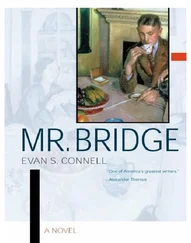Harriet reappeared wheeling the cart. She rolled it to a stop in front of Mrs. Bridge, who then poured out the tea, Harriet delivered a cup to Gadbury, who drank It at once and who then looked very hopefully and earnestly at the cart where the silver tea pot stood.
“Would you care for another cup, Mr. Gadbury?”
He said that would be nice, so he had another, and before long he had another.
“How’s the painting coming along?” he asked.
“I haven’t had a spare moment in weeks, Mr. Gadbury/*
“I sure remember that malachite sherry bottle/* he said. There was a pause. “You really let yourself go on that one.”
Mrs. Bridge smiled courteously. She waited for him to state his business. Gadbury stared around the room. He began to squint at an etching of a cathedral that occupied the space above the sofa. No one in the family had looked at it for years.
“I don’t know about that/* Gadbury said, studying It intently. “Maybe, but then again maybe not. There’s a quality, all right.” He discovered the water which had been dripping on the carpet from his hat and his coat, and nervously placed his foot on a soggy spot. At length he became aware that she was waiting for him to explain the visit, so he worked out of his pocket a crumpled little magazine which was titled The Dob er man, and he held this up for her to see.
“Oh?” said Mrs. Bridge.
“I don’t guess you or Mr. Bridge’d be much interested in subscribing to this, would you?”
She had suspected he was selling something, and she knew that whatever it might be she would have no use for it.
“I really hadn’t planned on subscribing to any more magazines, Mr. Gadbury/*
He nodded in complete understanding. “You wouldn’t want it unless you had a Doberman/* Then an idea came to him and he sat erect and asked, “You don’t have one, do you?”
“No, we don’t/’
“Nobody does/* he said despondently. “They eat an awful lot, I think.”
“Oh? Don’t you have one?”
“No. But when I was a boy I used to have a dog/* He looked to see if this fact would arouse her interest. Finding it did not, after wiping his nose on his sleeve, he considered his magazine and launched Into a sales talk. “This Issue tells about one who wouldn’t eat anything except sirloin steak and worked for the police department in Toledo/’ He mulled over this information and added pertinently, “Its name was Lieutenant.” Suddenly he opened the magazine to the center spread, which had snapshots of nine Dobermans, and he held this up for her to see.
“My, they’re ferocious looking, aren’t they?”
Gadbury then had another look at the photographs. “I guess so. I hadn’t thought about It.”
Mrs. Bridge tipped her head slightly to Indicate she was considering the pictures further. Gadbury became enthusiastic.
“This magazine comes out every month,” he said. He was overtaken by a chill; he shivered, sniffled, stamped his feet, and looked around wildly. “It tells how you train these dogs/* he said, speaking with great rapidity, “and, ah, eeehe-he-ahha-sha!” sneezed Mr. Gadbury. “I’ve got a cold/’ he said feebly, and then the life went out of him and he sat with his head bowed, silent, while a few more drops of water sank into the carpet. “It isn’t that the school doesn’t pay a living wage,” he went on without lifting his head. “It’s just that my daughter got in trouble and now she’s in the hospital. I didn’t know hospital bills were so high/* He rolled the magazine Into a tube and began striking it against his palm.
“Do you sell many subscriptions?”
Gadbury made no attempt to answer.
“How long have you been at it?” she asked.
“About two months,” he said quietly.
Mrs. Bridge took a deep breath and clasped her hands. “Tell me, Mr. Gadbury, tell me the truth. Have you sold any at all?”
“No. But there was a lady the week before last who said she’d ask her husband/’
“All right/* said Mrs. Bridge. “You may put me down for a subscription.”
Gadbury raised his head and looked at her in grave astonishment*
52. Second Lesson in Spanish
While cleaning out the back-hall closet she came upon the phonograph records and the booklet on how to speak Spanish. The records were covered with dust and one o them was broken. On an Impulse she let the closet remain as it was; she carried the records Into the living room and placed the unbroken ones on the phonograph. Then she seated herself with the booklet to refresh her memory, and finding that she could recall the procedure with no difficulty she set the needle on the first record.
“Buenas dias, Senora Brown. C6mo estd usted?”
“Buenas dias, Senor Garreiio. Muy bien, gracias. Y usted?”
At the pause she was ready, “Buenas dias, Senor Carreno/* she said pleasantly. “Muy bien, gracias. Y usted?**
“Muy Men.”
The record squeaked and clicked, clicked again, and continued, Senor Carreno remarked that Senora Brown was in Madrid. Senora Brown evidently realized this.
“Estoy in Madrid/*
“Estoy in Madrid,” Mrs, Bridge repeated.
From upstairs Carolyn called, “Mother!”
n8 # Mrs. Bridge
“What is it, dear?” Mrs. Bridge called.
“La gusta Madrid?”
“Si, mucho/’
“Motherl”
With a sigh Mrs. Bridge got up and walked to the bottom of the stairs. “What is it, Corky? I’m busy right now.”
“I can’t find my saddle shoes/*
Mrs. Bridge returned to the living room, turned off the phonograph, and came back to stand with one hand on the newel post. “I couldn’t hear you, dear. What did you say?”
“What happened to my saddle shoes? I left them, out for Harriet to clean but they aren’t here.”
Mrs. Bridge began climbing the stairs, because there was bound to be an argument and she did not like shouting back and forth. “I gave them to the laundress. They were simply too filthy to be worn.”
Carolyn moaned and rocked on her heels, this being the current method of expressing agony. “What am I going to wear to the mixer?”
Mrs. Bridge had stopped to catch her breath on the landing. Now she continued around the turn and up the remaining steps.
“Well, dear, you certainly can’t wear saddle shoes to a dance/*
Carolyn spoke slowly and distinctly. “It isn’t a dance, Mother, it’s a mixer. It’s in the gymnasium after school.”
“I thought you danced at a mixer.”
“You do, but it’s different. Totally/’ Carolyn was rocking on her heels again. “I mean, it’s already practically the end of my free period and I’ve got to get back for Latin and obviously you don’t expect a person to wear these Indian skins even if it is a mixer. Fortunately/’ She held out one small moccasined foot and wiggled the toe.
“I should think you’d want to wear your new brown oxfords. They certainly cost enough/*
“Oh, ugh! I mean, you’re so behind.”
“I suppose so/” Mrs. Bridge responded drily. “But I’ll thank you not to be Impertinent/’
“Oh, I’m sorry, Mother, but after all this Is utterly tragic. I mean, let’s not be bland.”
“Well, let’s see, I suppose die only solution Is to drive to the Plaza and get you a new pair of saddle shoes.”
“There Isn’t time! I mean 1 have this pathetic Latin!”
“Oh, dear/* said Mrs. Bridge wearily, for It seemed such problems were always arising. “I’m supposed to pick up Madge Arlen at two o’clock, but I suppose If you must have them I can run down to the Plaza right now and deliver them to you at school. I honestly believe half my life has been spent arranging the family schedule.”
Carolyn, who did not want anyone to see her mother delivering a pair o shoes, said, “Just leave them in the principal’s office/*
Читать дальше












